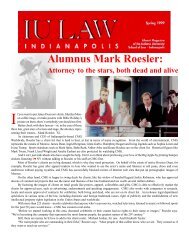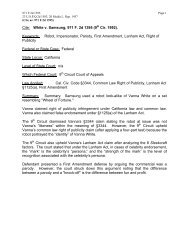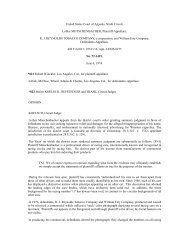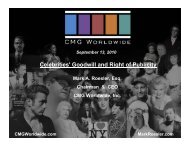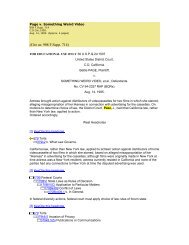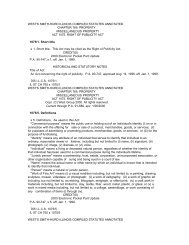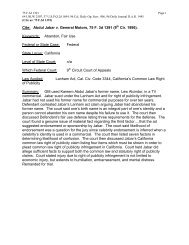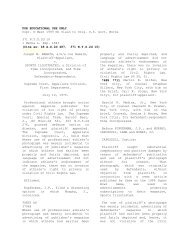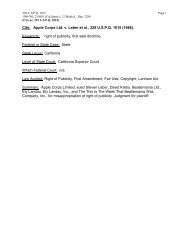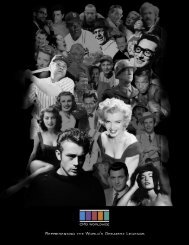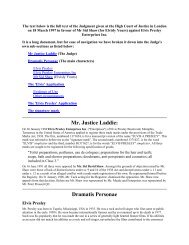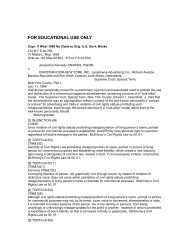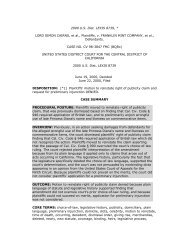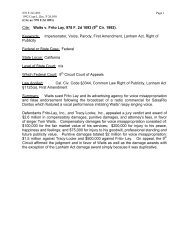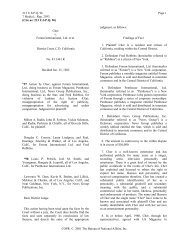Hustler v. Falwell.pdf - Mark Roesler
Hustler v. Falwell.pdf - Mark Roesler
Hustler v. Falwell.pdf - Mark Roesler
You also want an ePaper? Increase the reach of your titles
YUMPU automatically turns print PDFs into web optimized ePapers that Google loves.
of action applicable to virtually all uses of a person's name or picture,<br />
PAGE 36<br />
695 F. Supp. 112, *122; 1988 U.S. Dist. LEXIS 8694, **29;<br />
8 U.S.P.Q.2D (BNA) 1562; 15 Media L. Rep. 2097<br />
including the use of the new media, has been narrowly construed by the courts,<br />
especially in the context of persons denominated "public figures," so as "to<br />
avoid any conflict with the free dissemination of thoughts, ideas, newsworthy<br />
events, and matters of public interest" guaranteed by the First Amendment. . . .<br />
Thus, as has been noted by the New York courts, "freedom of speech and the<br />
press<br />
under the First Amendment transcends the right to privacy." Namath v. Sports<br />
Illustrated, 80 Misc. 2d 531, 535, 363 N.Y.S.2d 276, 280 (N.Y. Co. 1975), aff'd,<br />
48 A.D.2d 487, 371 N.Y.S.2d 10 (1st Dep't 1975), aff'd mem., 39 N.Y.2d 897,<br />
352<br />
N.E.2d 584, 386 N.Y.S.2d 397 (1976).<br />
Ann-Margret, 498 F. Supp. at 404 (other citations omitted). The court also nod<br />
"there is little doubt that the plaintiff, who has starred in numerous movies<br />
and television [**30] programs . . . is, as the term has come to be<br />
understood, a 'public figure.'" Id. Accordingly, the court granted summary<br />
judgment dismissing the complaint, stating:<br />
Plaintiff's claim fares no better when considered as one for violation of the<br />
common law " right to publicity. " As has been noted, . . . [the right to<br />
publicity] "does not invest a prominent person with the right to exploit<br />
financially every public use of name or picture." . . . It is only when such use<br />
is made "for advertising purposes, or for the purposes of trade," . . . that a<br />
cause of action arises. And it is well settled that simple use in a magazine<br />
that is published and sold for profit does not constitute a use for advertising<br />
or trade sufficient to make out an actionable claim, even if its "manner of use<br />
and placement was designed to sell the article so that it might be paid for and<br />
read." Oma v. Hillman Periodicals, Inc., 281 A.D. 240, 244, 118 N.Y.S.2d 720,<br />
724 (1st Dep't 1953).<br />
Ann-Margret, 498 F. Supp. at 406 (other citations omitted).<br />
In Hicks v. Casablanca Records, 464 F. Supp. 426 (S.D.N.Y. 1978), the<br />
Honorable Lawrence W. Pierce addressed another factual situation similar to<br />
that<br />
presented [**31] here. Plaintiffs, the heir and assignees of the late mystery<br />
writer Agatha Christie, sued regarding the distribution of a movie and book<br />
entitled "Agatha," a fictional work about what might have transpired during an<br />
actual eleven day disappearance by Ms. Christie during her life. The court noted<br />
that Ms. Christie had been "one of the best-known mystery writers in modern<br />
times" and that she had cultivated her name "in such a way as to make it almost<br />
synonymous with mystery novels." Hicks, 464 F. Supp. at 428. The plaintiffs<br />
sought to enjoin distribution of the film and book, alleging unfair competition<br />
and infringement of the right of publicity, and the defendants moved to<br />
dismiss the complaint on First Amendment grounds. In considering the First<br />
Amendment's applicability, the court stated:<br />
. . . more so than posters, bubble gum cards, or some other "merchandise,"<br />
books<br />
and movies are vehicles through which ideas and opinions are disseminated and,



